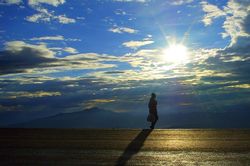
The art of Dharma practice includes engaging skillfully with complementary aspects of practice. Sometimes there can even seem to be "paradoxes" in the instructions. These are invitations to expand our understanding of what practice is; in the end, practice isn't any one thing.
One domain where we can develop balance has to do with our attitude in approaching and engaging teachings. How do we relate to instructions from teachers, Dharma talks, and suttas we read? These things play the role of guiding and shaping our understanding, our behavior, and our practice. What is our relationship to them? (For more in this topic, here is a talk I gave).
Faith/ Trust/ Surrender
One possibility is that we have the attitude that the teachings are wiser than we are, and it’s best to just let them do their work on us.
If the teacher says “bow 108 times before every sit,” this trustful attitude means that you just do it. You don’t add your opinion about it, try to analyze whether it’s working, start playing around with it, or start checking for results. It takes some humility, but you just do it. You let the process do its work on you.
In this practice, we really do have to be able to do things where we don’t know the reason or result. Where it might get a little (or a lot) uncomfortable. And if not from a teacher telling you to bow 108 times, then it will come from the practice itself -– at some point, your heart or mind will demand something that you were not expecting and are not totally convinced about.
The Buddha, in at least one sutta, was very clear that his followers need to have this kind of faith. (MN 70, At Kitāgiri. This teaching is for ordained monastics, and doesn’t apply to people who are not declared followers). He states: “For a faithful disciple intent on fathoming the Teacher’s Dispensation, it is natural that he conduct himself thus: ‘The Blessed One is the Teacher, I am a disciple; The Blessed One knows, I do not know.’” And someone who thinks this way, it is said, the teachings are “nourishing and refreshing," and the disciple will go on to achieve the fruits of the path. The Buddha also criticized an overly rational, thought-based mindset (see, for example, MN 63, The Shorter Discourse to Malunkyāputta).
So there is this idea of “just take the medicine.” You are not wise – that’s the problem – and you just have to trust if you are really going to transform.
Inquiry (including thought!)
But the Buddha didn’t consistently demand some kind of total capitulation. He wanted to foster people who are self-reliant. Overall, the Buddha didn’t really like obsequiousness, and valued people trying to figure it out for themselves, even if they made some wrong turns along the way.
One clue is to notice that people often came with questions, as shown throughout the suttas. Obviously this mode of learning was important and valued.
More directly, there is the teaching of the Kalama Sutta (AN 3.65): “…don't go by reports, by legends, by traditions, by scripture, by logical conjecture, by inference, by analogies, by agreement through pondering views, by probability, or by the thought, 'This contemplative is our teacher.' When you know for yourselves that, 'These qualities are unskillful; these qualities are blameworthy; these qualities are criticized by the wise; these qualities, when adopted & carried out, lead to harm & to suffering' — then you should abandon them.”
We are encouraged not to just blindly restrain behavior, but to go ahead and act, but to act with awareness, so that we can discern if something is leading toward harm or benefit. We are to investigate.
Finding Balance
Bhikkhu Bodhi says (in his essay: Two Faces of the Dhamma): "When we try to determine our own relationship with the Dhamma, eventually we find ourselves challenged to make sense out of its two seemingly irreconcilable faces: the empiricist face turned to the world, telling us to investigate and verify things for ourselves, and the religious face turned to the Beyond, advising us to dispel our doubts and place trust in the Teacher and his Teaching."
The Buddha himself used both Faith and Inquiry. He had to have faith in something he couldn’t see yet, because there were no teachers for him once he struck out on his own. And his path included consideration, like assessing that the ascetic practice wasn’t working and remembering a deep jhana experience as a child -– so there was “analysis” (wisdom) also.
We don’t necessary understand how to navigate this easily. Even as dedicated practice develops, we will continually be called to let go and have faith in the next step unfolding. Experience gets different as meditation deepens, and our life may start to flow in unexpected ways. Can we ride this? And can we continue to inquire and bring order to our life, changing/honing/clarifying our intentions so that the engagement remains strong?
It may be interesting to consider the following in your own practice and life:
In your own practice and life:
Image: Great Rift Valley.jpg – By Xiaojun Deng (Flickr: Great Rift Valley) [CC BY 2.0 (http://creativecommons.org/licenses/by/2.0)], via Wikimedia Commons
One domain where we can develop balance has to do with our attitude in approaching and engaging teachings. How do we relate to instructions from teachers, Dharma talks, and suttas we read? These things play the role of guiding and shaping our understanding, our behavior, and our practice. What is our relationship to them? (For more in this topic, here is a talk I gave).
Faith/ Trust/ Surrender
One possibility is that we have the attitude that the teachings are wiser than we are, and it’s best to just let them do their work on us.
If the teacher says “bow 108 times before every sit,” this trustful attitude means that you just do it. You don’t add your opinion about it, try to analyze whether it’s working, start playing around with it, or start checking for results. It takes some humility, but you just do it. You let the process do its work on you.
In this practice, we really do have to be able to do things where we don’t know the reason or result. Where it might get a little (or a lot) uncomfortable. And if not from a teacher telling you to bow 108 times, then it will come from the practice itself -– at some point, your heart or mind will demand something that you were not expecting and are not totally convinced about.
The Buddha, in at least one sutta, was very clear that his followers need to have this kind of faith. (MN 70, At Kitāgiri. This teaching is for ordained monastics, and doesn’t apply to people who are not declared followers). He states: “For a faithful disciple intent on fathoming the Teacher’s Dispensation, it is natural that he conduct himself thus: ‘The Blessed One is the Teacher, I am a disciple; The Blessed One knows, I do not know.’” And someone who thinks this way, it is said, the teachings are “nourishing and refreshing," and the disciple will go on to achieve the fruits of the path. The Buddha also criticized an overly rational, thought-based mindset (see, for example, MN 63, The Shorter Discourse to Malunkyāputta).
So there is this idea of “just take the medicine.” You are not wise – that’s the problem – and you just have to trust if you are really going to transform.
Inquiry (including thought!)
But the Buddha didn’t consistently demand some kind of total capitulation. He wanted to foster people who are self-reliant. Overall, the Buddha didn’t really like obsequiousness, and valued people trying to figure it out for themselves, even if they made some wrong turns along the way.
One clue is to notice that people often came with questions, as shown throughout the suttas. Obviously this mode of learning was important and valued.
More directly, there is the teaching of the Kalama Sutta (AN 3.65): “…don't go by reports, by legends, by traditions, by scripture, by logical conjecture, by inference, by analogies, by agreement through pondering views, by probability, or by the thought, 'This contemplative is our teacher.' When you know for yourselves that, 'These qualities are unskillful; these qualities are blameworthy; these qualities are criticized by the wise; these qualities, when adopted & carried out, lead to harm & to suffering' — then you should abandon them.”
We are encouraged not to just blindly restrain behavior, but to go ahead and act, but to act with awareness, so that we can discern if something is leading toward harm or benefit. We are to investigate.
Finding Balance
Bhikkhu Bodhi says (in his essay: Two Faces of the Dhamma): "When we try to determine our own relationship with the Dhamma, eventually we find ourselves challenged to make sense out of its two seemingly irreconcilable faces: the empiricist face turned to the world, telling us to investigate and verify things for ourselves, and the religious face turned to the Beyond, advising us to dispel our doubts and place trust in the Teacher and his Teaching."
The Buddha himself used both Faith and Inquiry. He had to have faith in something he couldn’t see yet, because there were no teachers for him once he struck out on his own. And his path included consideration, like assessing that the ascetic practice wasn’t working and remembering a deep jhana experience as a child -– so there was “analysis” (wisdom) also.
We don’t necessary understand how to navigate this easily. Even as dedicated practice develops, we will continually be called to let go and have faith in the next step unfolding. Experience gets different as meditation deepens, and our life may start to flow in unexpected ways. Can we ride this? And can we continue to inquire and bring order to our life, changing/honing/clarifying our intentions so that the engagement remains strong?
It may be interesting to consider the following in your own practice and life:
In your own practice and life:
- When has it been good to just accept?
- Have there been times when something amazing opened up that you could never have imagined, and which your judgmental mind might have rejected?
- When did you need to dig in, make assessments, and ask questions?
- Were you ever too gullible? Or did you ever just hover around on the surface believing something magic would happen, and you realize now that you could have engaged more fully and gotten a deeper experience?
Image: Great Rift Valley.jpg – By Xiaojun Deng (Flickr: Great Rift Valley) [CC BY 2.0 (http://creativecommons.org/licenses/by/2.0)], via Wikimedia Commons

 RSS Feed
RSS Feed